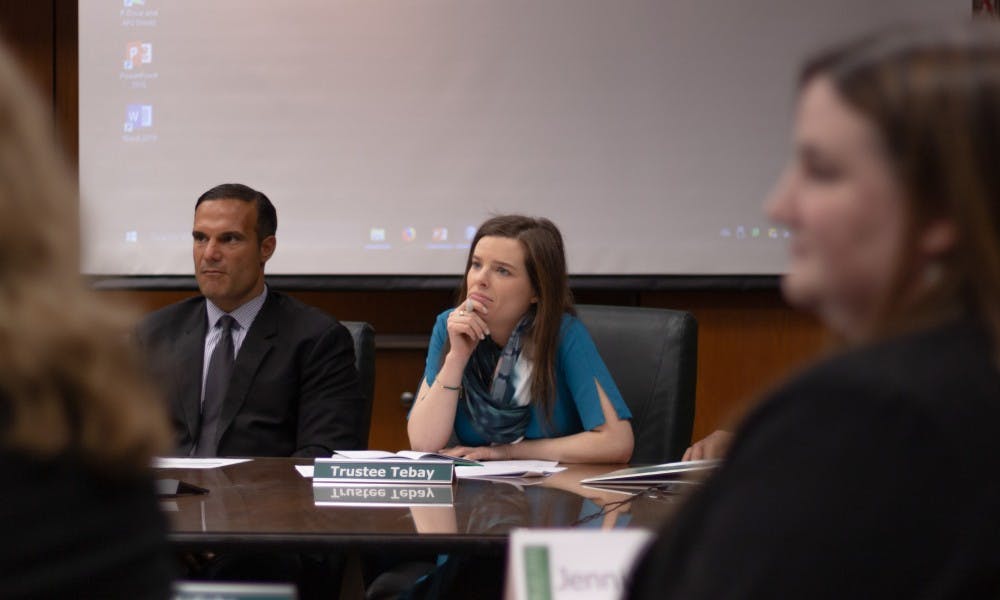In creating a new healing assistance fund for survivors of Larry Nassar, the MSU Board of Trustees is seeking input from Michigan State’s Relationship Violence and Sexual Misconduct, or RVSM, Expert Advisory Workgroup.
Chairperson of the RVSM workgroup, psychology professor Rebecca Campbell, said the group has had conversations with Trustees Kelly Tebay, Brian Mosallam and Nancy Schlichting so far.
While discussions are preliminary, Campbell said the workgroup has been sharing its knowledge of trauma research and weighing in on ideas the board is considering for the fund.
“What we’ve been trying to communicate thus far to the trustees is that this is not an easy solution, because the impact of trauma is quite severe and it can take a very long time for treatment,” Campbell said. “That treatment can be highly variable, so it’s hard to know for any one survivor — for any one parent of a survivor — how long that treatment might take.”
The expert workgroup was created by former Interim President John Engler last February to “formalize recommendations drawn from the input of survivors, students, faculty and staff from across campus.” In addition to other faculty and administration experts, the workgroup includes Lt. Andrea Munford, the MSUPD detective who built the criminal case against Nassar.
In preliminary discussions, the workgroup expressed to Tebay and Mosallam that family members of survivors are also negatively impacted by survivors’ trauma and have their own mental health needs that merit treatment, Campbell said.
“As they’re thinking about rebuilding the fund, research very clearly indicates that parents, significant others, spouses — at a minimum — would very likely have mental health needs,” she said, “If they’re thinking comprehensively about addressing the mental health impact of this trauma, they need to take into account the needs of the family members as well.”
Members of the board also want the fund to extend to survivor’s families, Tebay said.
“We think it’s equally as important for families and support systems and spouses to get that mental help as well,” Tebay said.
Campbell wants to make sure the board understands the severity of the trauma sexual abuse and sexual assault causes. Key issues she said the board needs to pay attention to are the long term treatment of post-traumatic stress disorder, depression, anxiety and suicide.
“Because suicidality is a key risk factor here, the fund needs to be stable and it needs to be guaranteed for a very clear period of time or scope of people,” Campbell said. “They need to think very carefully about those parameters to ensure people have stable treatment that will not be interrupted again.”
In December, Engler moved forward with the decision to close the initial Healing Assistance Fund, against the workgroup’s recommendation.
Before it closed, a memo summarizing the workgroup’s research on trauma and treatment for sexual assault survivors went into detail about how discontinuing the Healing Assistance Fund could negatively affect survivors.
Tebay said the board wants to make sure the fund is protected so a president can’t close it at any time, and that a majority vote is required to close it for any reason.
Tebay also said she wants to make sure the new fund is opened as fast as possible. The board is working hard to make sure the fund is done the “right way,” she said, which includes discussions with survivors, their families and the advisory workgroup.
“It’s important that this time we actually get survivor feedback, which is not something that was asked for previously,” Tebay said. “A lot of them used the healing fund, so I think it’s important for us to figure out what worked, what didn’t work, their suggestions for things to be changed. I want to make sure that when we do it this time, we are being thoughtful and that we do it the right way.”
In addition to discussions with the workgroup, the board has reached out to the survivor community, Chair of the Board of Trustees Dianne Byrum said. An update on the healing fund will be on the agenda for the Feb. 15 board meeting.
“There’s been a significant amount of work done over the last couple of weeks, but it’s still a work in progress,” Byrum said. “By the time we get to our Feb. 15 board meeting, it should have more structure. We will be sharing that with the public.”
Support student media!
Please consider donating to The State News and help fund the future of journalism.
Discussion
Share and discuss “Board seeking input from expert workgroup, survivors for new healing fund” on social media.







